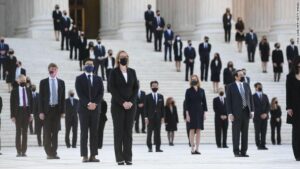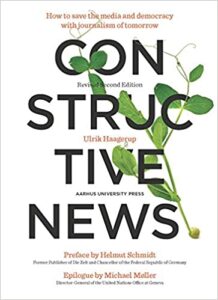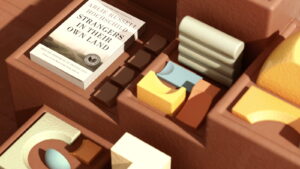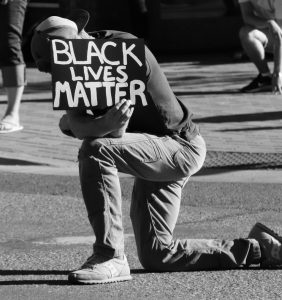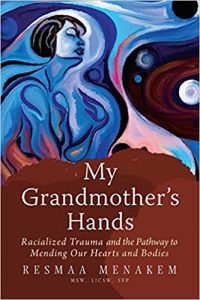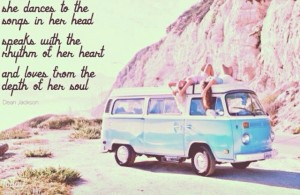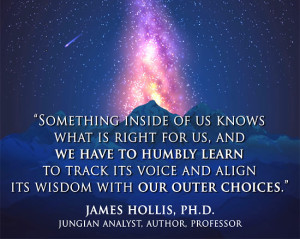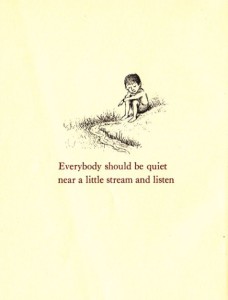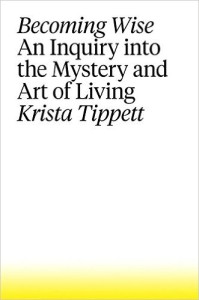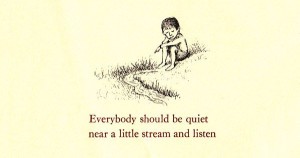listen
Dialogue. And listen.
October 10, 2020And lead.
Ruth Bader Ginsburg “knew the power of example—that if you live your own life according to your principles, others will follow,” writes her former clerk, Ryan Y. Park, Solicitor General of North Carolina.
The Atlantic
My Friend and Boss, Ruth Bader Ginsburg
“A big deal in the revival of local news: Nonprofit Mountain State Spotlight
Dialoging.
Dr. David Bohm:
“Dialogue is really aimed at going into the whole thought process and changing the way the thought process occurs collectively. We haven’t really paid much attention to thought as a process. We have engaged in thoughts, but we have only paid attention to the content, not to the process.
It is proposed that a form of free dialogue may well be one of the most effective ways of investigating the crisis which faces society, and indeed the whole of human nature and consciousness today. Moreover, it may turn out that such a form of free exchange of ideas and information is of fundamental relevance for transforming culture and freeing it of destructive misinformation, so that creativity can be liberated.”
Leah Garces:
The first lesson I learned is that we have to become comfortable with being uncomfortable. Only talking to people who agree with us, it’s not going to get us to the solution. We have to be willing to enter other people’s space. Because quite often, the enemy has the power to change the problem that we’re trying to solve.
The world’s smallest and biggest problems, they won’t be solved by beating down our enemies but by finding these win-win pathways together. It does require us to let go of that idea of us versus them and realize there’s only one us, all of us, against an unjust system. And it is difficult, and messy, and uncomfortable.
Seth Godin:
The arc and the arch.
They sound similar, but they’re not.
An arc, like an arch, is bent. The strength comes from that bend.
But the arc doesn’t have to be supported at both ends, and the arc is more flexible. The arc can take us to parts unknown, yet it has a trajectory.
An arch, on the other hand, is a solid structure. It’s a bridge that others have already walked over.
Our life is filled with both. We’re trained on arches, encouraged to seek them out.
But an arc, which comes from “arrow,” is the rare ability to take flight and to go further than you or others expected.
HOW TO HAVE A CONVERSATION WITH YOUR POLITICAL OPPONENTS
SANNE BLAUW
This story is from Strangers in Their Own Land by Arlie Hochschild.
‘For this book, the professor emerita of sociology immersed herself in the American political right wing. Over the course of five years, she regularly stayed in ultraconservative “Bayou Country” in Louisiana. She herself comes from lefter than left Berkeley, California. She couldn’t have left her bubble any further behind.
‘When left-wing sociologist Arlie Hochschild went to live in a right-wing stronghold in the American South, she was entering “enemy” territory.
But, by listening to the people there – instead of arguing against them – she distilled a clear picture: right-wing Trump supporters felt like victims of a society that had left them behind.
In an era where debate has descended into a televised shouting match, it’s easy to feel like you’re at war with people who disagree with you.
But Hochschild learned that by laying down our arms and trying to understand, even empathise with, our political opponents, we can learn how to have constructive political conversations.’
You don’t have to agree with political opponents to understand where they’re coming from
‘Having a heart-to-heart conversation with an ideological opponent can feel uncomfortable – unsafe even. But sociologist Arlie Hochschild proves that it pays off. She immersed herself in a conservative stronghold in the Southern United States for five years and wrote a book about it.’
Not everyone agrees with this approach, Hochschild said during a 2016 interview with Ezra Klein. It can feel as though you’re surrendering, laying down your weapons and walking over to the enemy. But, she says: “if you want to compare it to anything, it’s a diplomatic mission. It’s saying: look, we can work this out, let’s see what the basis of that could be”.
Whether it’s about corona, climate or benefits, let’s carry out these diplomatic missions more often. That doesn’t mean you have to agree with each other, but at least you’re making a genuine attempt to understand the other person.’
We’re listening. Help us learn.
June 7, 2020It has taken the massacre of so many black bodies to get us to this moment.
Thank you, Kimberly, for educating.
This! ?? IG: kimberlylatricejones & djonesmedia pic.twitter.com/l8zX4CULEg
— Trevor Noah (@Trevornoah) June 6, 2020
And Elmo.
White Body Supremacy
“…the term “white body supremacy” — I’m operationalizing it. The white body is used to hearing things that make it comfortable. And so when you say something like ‘white supremacy’ especially here in Minnesota, everybody goes, “Yes, absolutely. Yeah, yeah, absolutely.’ And then what happens is, it goes — just the term, “white supremacy,” is a very intellectual term. It doesn’t land in the body.
-Resmaa Menakem, therapist and trauma specialist in Minneapolis who teaches across the U.S.
[On Being]
Educate, learn, listen, align, act.
June 6, 2020Hunger Coalition in Blaine County, Idaho:
‘Speaking out against systemic racism with people across the nation and across the political spectrum aligns with our values, but we must also act on our words. To that end, The Hunger Coalition supports peaceful nonviolent protest and advocacy as a way to:
- Stand up for fundamental American principles of fairness and justice.
- Affect change at the system level.
- Raise awareness around issues that affect the people we serve.
- Honor our values of equity and inclusiveness.
- Speak out against discrimination suffered by people of color, including police brutality.
- Ensure The Hunger Coalition is seen as a safe place for all people to access food, regardless of race, class, gender, sexual orientation, ethnicity, citizenship, disability, or religion.
Please consider joining us in the following actions:
Educate: read, read, and read more about how racial injustice is rampant in every corner of our country. Share what you learn with others.
Demonstrate: peaceful protest is fundamental to our democracy and how we can shine a light on discrimination.
Donate: make a donation to organizations working to heal our nation and bring us all together.
Organize: join forces with people on a shared mission. Petition, canvass, campaign, and put pressure on our leadership to enact change.
Vote: vote for candidates at the local, state, and national level who support policies that make life better for people of color. There is an election on November 3, 2020. Research the candidates and vote.’
-Jeanne Liston, Executive Director at the Hunger Coalition
[Image: Deborah Knapp]
Listen.
Krista Tippet, On Being:
‘…horrific trauma inflicted on black bodies in the “new world” of America — which, as Langston Hughes wrote, “never was America to me.” We are all literally carrying – breathing, reliving, and so repeating — much that didn’t happen to us personally. It’s one way to finally grasp why talking about race, and “teaching our brains to think better” about race, has fallen brutally, tragically short: “The vital force behind white supremacy,” Resmaa Menakem writes in his extraordinary book My Grandmother’s Hands, “is in our nervous systems.”
Resmaa Menakem is a teacher and visionary in this city (Minneapolis), though I only became aware of his groundbreaking work a few months ago. Just before the pandemic sent us into lockdown, I sat across from him in our studio on Loring Park. He watched me as closely as he listened to my words. He caught me bracing at the term “white supremacy,” and taught me that noticing such bracing is exactly where I have to begin to live differently. He’s drawing on knowledge we’re just now gaining about systems and processes in our bodies that we’re only now learning to see: vagus nerve, psoas muscle, trauma, epigenetics. He makes a stunning connection between generations of trauma that white bodies inflicted on each other in the centuries we call the Dark Ages and the generations of horrific trauma inflicted on black bodies in the “new world” of America.
At the On Being Project right now we are listening, and listening again, to Resmaa as well as others who’ve been teaching us in recent years and to whom we will turn for new wisdom in this time. We’re trying to carry our questions with as much humility as we carry what feel like insights and answers.’
Flourish
May 28, 2019“We must listen to what is supporting us. We must listen to what is encouraging us. We must listen to what is urging us. We must listen to what is alive in us.”
I personally was so trained not to trust those voices that I often did not hear the voice of God speaking to me, or what Abraham Lincoln called the “better angels of our nature.”
Yes, a narcissistic person can misuse such advice, but someone genuinely living in love will flourish inside such a dialogue.
We must learn how to recognize the positive flow and to distinguish it from the negative resistance within ourselves.
We must learn how to recognize the positive flow and to distinguish it from the negative resistance within ourselves. It takes years of practice.
Center for Action and Contemplation
❧
Llama Love
January 8, 2019Llisten to a Llama
Llive simply
Llisten to your heart
Llaugh out lloud
Llearn something new each day
Llet go of the llittle things
Llook for the good win everyone
And always remember…
Llove deeply!
January 5, 2017
‘You shall no longer take things at second or third hand,
nor look through the eyes of the dead, nor feed on
the specters in books;
You shall not look through my eyes either, nor take
things from me;
You shall listen to all sides, and filter them from yourself.
-Walt Whitman
?
September 26, 2016Listen.
June 23, 2016Gratitude. ✿
June 20, 2016Wondering.
Is being abundantly intuitive a curse?
Or.
Incredibly enlightening?
I think it is the latter. ✿´¯`*•.¸¸✿
✿´¯`*•.¸¸✿
‘Community is just doing my part.’
May 16, 2016pp. 128-129
‘You tell a lot of stories of people you met on the road. And they’re the kind of stories that we’re becoming familiar with. Stories of good people who are working too many jobs and still not getting by. Stories of college students who are carrying way too much to be able to focus on college. Stories of people who don’t have the money to get the care they need and die too young. I am aware in my self and I think all around me, maybe, those of you in this room – – there are so many of us anguished about these gulfs that seem to be growing in our society, in our community, and in our nation. And it’s not that we don’t care. We care deeply. But we don’t know how to connect that care in meaningful, practical ways. To do something about it.’
[…]
‘There are several levels of that. One is the doing something. I sometimes think we, in the United States, think we ought to do something about everything and that it’s my job to fix everything. Well it’s not That’s way beyond us. It’s more important, I think, that we listen deeply to our stories and then see where it leads. And that’s the piece. If we all do our part…’
